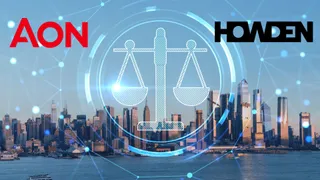Transferable skills bring fresh approaches for Hiscox
The multifaceted nature of insurers and their increasingly complex operations mean an array of proficiencies, including analytical skills, are required for executives running such operations.
That was one of the themes that emerged from the first session of day three of the Intelligent Insurer Claims Innovation USA virtual event, when Grace Hanson, chief claims officer, Hiscox, had a virtual chat with moderator Martin Ellingsworth, senior analyst, Celent.
Ellingsworth started by asking Hanson to explain how she had gone from being a lawyer to a chief claims officer.
“Being a lawyer meant analysing a lot of things and as I started out as a commercial lawyer, which meant I had to analyse a lot of financial information,” she recalled.
Her move to the insurance industry therefore made sense, especially when it came to her interests.
“It was one step after the other,” she explained. “I’ve always been interested in innovation. I’ve been involved in two startups, and Hiscox feels a bit like a startup at times, so here I am.”
Understanding the issues
Ellingsworth pointed out that Hiscox covers a wide geographical range, as well as a wide range of products, and asked how the company went about picking the right technologies to use.
“It’s important for any insurer to understand the strategy of that business. When I worked for a startup it was monoline, so it was fairly easy to implement innovation,” Hanson said.
When she moved to Hiscox she brought with her that view of how to see startups and leverage opportunities. As she put it: “always start with understanding the business, no matter what problems you then go on to solve”.
“The challenge at Hiscox is brand and internal values,” she explained. “We’re very orientated towards optimising the customer experience. That’s driven the business model into entry to new spaces such as small business owners.
“However, the high-touch customer experience doesn’t sit naturally with the driving need in today’s world to be fully digital, to be automated, to have mass use of data. Bespoke solutions don’t work if you don’t have the baseline.”
For example, she said, Nike customises its trainers, but still has very baseline technology in the production of its core features.
“That is the problem—how do you reconcile these two needs, of specialisation and generalisation?”
According to Hanson, the COVID-19 pandemic has shown the insurance industry that it has to understand these needs and demands in a full sense, rather than a narrow one. She thinks the industry tends, as business owners, to think about its problems in terms of tomorrow or the day after, instead of creating a vision of what things are actually like now.
New approaches
Ellingsworth asked how Hiscox’s global workforce is responding to the wide range of technology now available to the insurance industry.
“Hiscox has been working with a wide range of companies over multiple jurisdictions, including one in the US called Hi Marley that is essentially an artificial intelligence-enabled texting platform for insurers, better known as a chatbot,” said Hanson.
“In the UK we are using portal technology. With so much customer interaction these days it’s important for insurers to understand their own internal claims processes before dealing with insurtech startups,” she stressed.
“It’s great to have long-term strategic plans, but it’s also important to realise the benefits of the bottom line for next month or next year,” she added.
“As an industry we’ve tended to focus on metrics which were non-transactional—end-of-the-road metrics, in other words. But the reality is that metrics show that net promoter scores aren’t a great predictor for insurance.
“If the customer leaves a claims experience feeling good they’re more likely to feel good about the whole experience.
“We need to look a lot more closely at telephony—how often people are calling us, should we be calling them, how often do we exchange information, and so on. It’s not very expensive to do that. It’s about delivering what you can for the customer.”
Hanson added that it is very important for any claims department to invest in analytics. “That’s the starting point. If you do not understand what’s going on and the best information you have is what you already have, then it’s been my experience that many companies don’t understand their own structural data.
“It has been claimed that a company can increase profitability by 10 to 20 percent simply by better understanding the data they already have.
“Once you demonstrate value then new technology is always transferable. Your job as claims leader is to achieve results on the ground. Actual engagement with customers gets actual results—so don’t forget that part,” she concluded.
To watch the full session, titled ‘Partnership Power: Launch and Sustain Winning Collaborations with Start-Ups’, on-demand click here to visit the Claims Innovation USA virtual event website.
Already registered?
Login to your account
If you don't have a login or your access has expired, you will need to purchase a subscription to gain access to this article, including all our online content.
For more information on individual annual subscriptions for full paid access and corporate subscription options please contact us.
To request a FREE 2-week trial subscription, please signup.
NOTE - this can take up to 48hrs to be approved.
For multi-user price options, or to check if your company has an existing subscription that we can add you to for FREE, please email Elliot Field at efield@newtonmedia.co.uk or Adrian Tapping at atapping@newtonmedia.co.uk
Editor's picks
Editor's picks
More articles
Copyright © intelligentinsurer.com 2024 | Headless Content Management with Blaze

